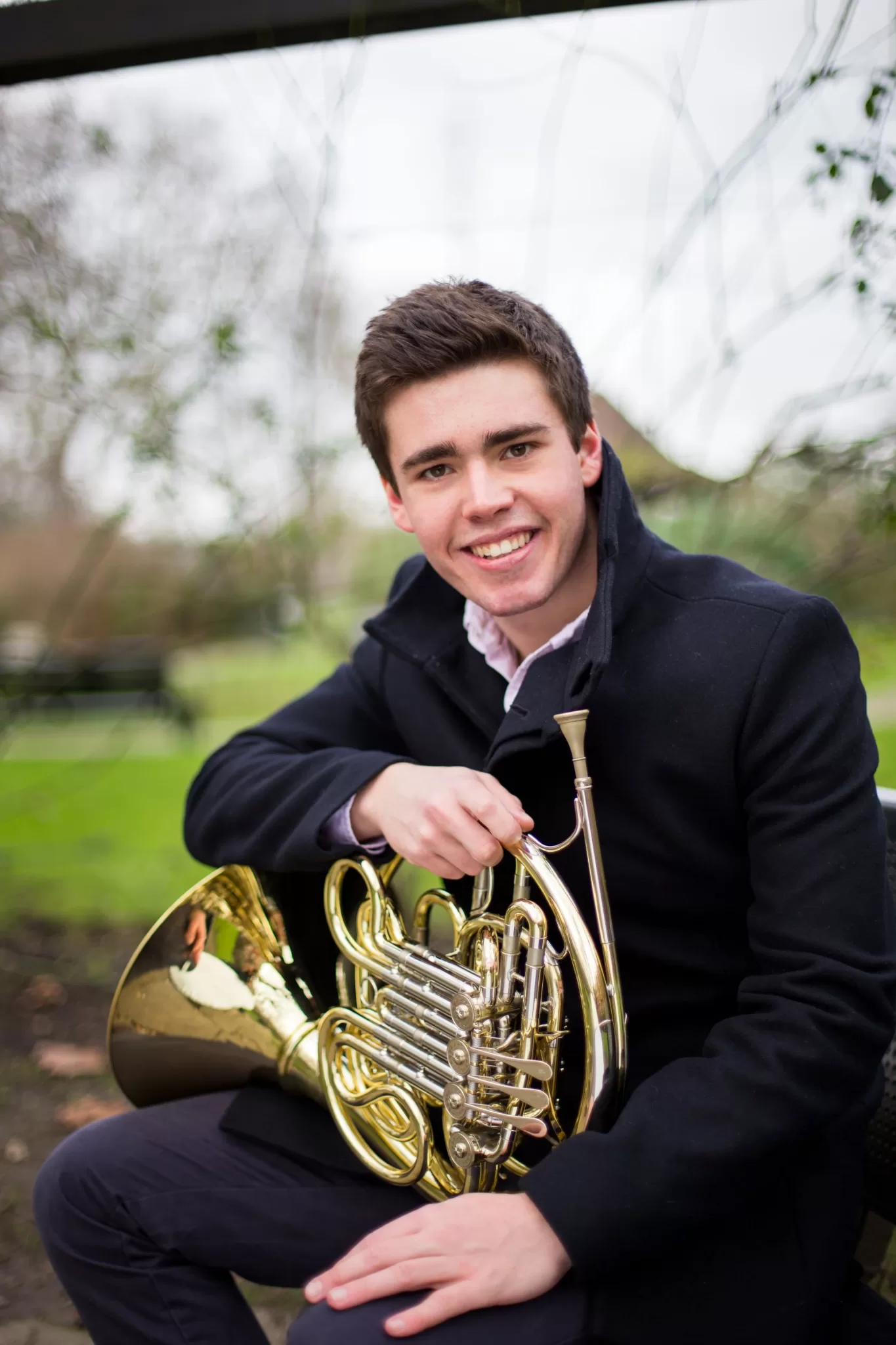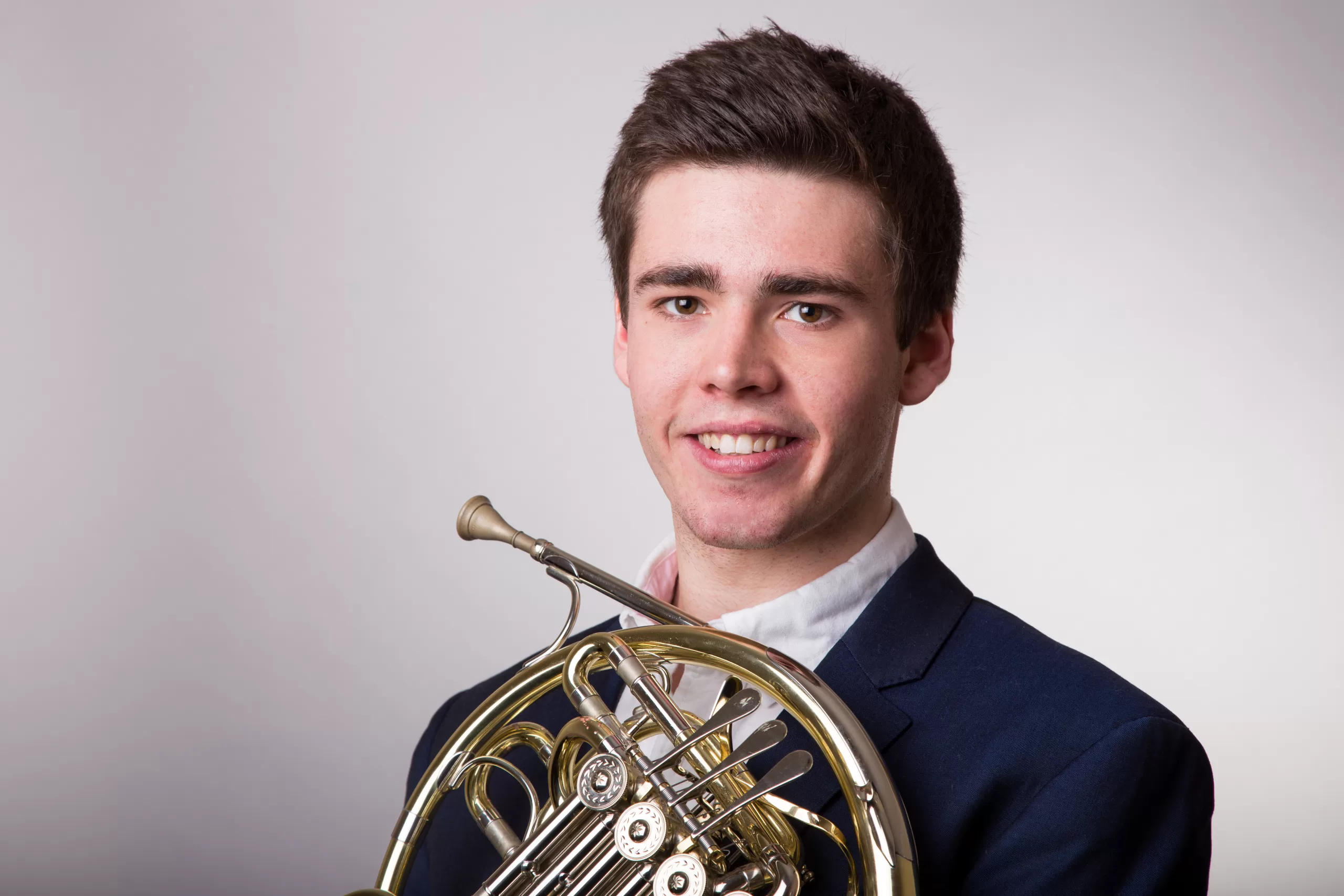
Following in His Father’s Footsteps: Brighton Philharmonic’s Alexei Watkins Reflects on Family, Britten, and the perils of playing the French Horn
When Alexei takes to the stage at Brighton Corn Exchange, it will be a full-circle moment for his father. The Brighton Philharmonic Orchestra’s principal horn player — one of its youngest ever principals — is the son of renowned horn player Richard Watkins, who spent two decades with the Philharmonia Orchestra before pursuing a prolific solo career. Young Alexei travelled all over Europe and the USA shadowing his father’s packed concert schedule, and immersing himself in classical music.
“I’ve always just wanted to do what Dad does,” Alexei says with a smile. “It’s quite a soppy story, really, but I’ve never wanted to do anything else.”
In Britten’s Serenade for Tenor, Horn and Strings, Alexei will be performing with internationally acclaimed tenor Mark Padmore, conductor Joanna MacGregor and Brighton Philharmonic Strings. It’s a piece that holds deep personal meaning for him. “I’ve heard my dad play the Serenade so many times,” he says. “It’s probably one of my favourite pieces because of that connection. In fact he’s played it with Mark, so to be taking his place for this performance will be hugely exciting. I have big shoes to fill!”
A Musical Family
Alexei’s parents met in an orchestra – his mother plays both the violin and the viola – and so family life revolved around music. His determination to become a horn-player is deep-rooted, but in fact his first instrument wasn’t brass at all.
“I actually started on the cello,” he says. “Apparently, I was three weeks old at my first concert — my dad was playing at Wigmore Hall and I slept through the whole thing. But when I was about four, I pointed at the double bass at an orchestral concert and said, ‘I want to play the biggest one!’ I think my parents thought it was too big, so I ended up with the cello instead.”
The cello, he says, still holds a special place in his heart. “It’s such a wonderful instrument — and in the orchestra, the cello and horn often share beautiful counter melodies. They sort of speak to each other across the orchestra.”
Around the age of 11, Alexei made the switch. The cello carried on until the end of school, but the horn gradually took over and became his main passion.
From Royal Academy to Brighton Philharmonic
Alexei’s early love of music began as a chorister. “That gave me fantastic training,” he says. “Singing every day, learning about phrasing, breathing and pitch. It really developed my ear.”
Later, he studied at the Royal Academy of Music, where he completed both undergraduate and postgraduate degrees. “It was an amazing experience,” he says. “You’re surrounded by so much talent. Playing in orchestras there taught me so much about musicianship and teamwork.”
That sense of ensemble has carried through to his role with the Brighton Philharmonic Orchestra, which he joined first as third horn before being appointed principal. “It’s such a friendly orchestra,” he says warmly. “There’s a hugely positive atmosphere. I found some orchestras struggled with morale after the pandemic, but I’ve never felt that in Brighton. The orchestra is going from strength to strength.”
When his predecessor, John James, retired, Alexei was invited to step up. “It’s a real privilege,” he says. “As principal, you’re not just playing — you’re also looking after your section, making sure everyone’s happy and performing their best. It’s your role to create a sense of teamwork and camaraderie.”
The Horn: A ‘Soulful but Risky’ Instrument
The French horn has a reputation as one of the most difficult instruments in the orchestra – a claim Alexei jokingly embraces. “We horn players like to keep that myth alive,” he laughs. “It gives us some leverage. Every time you take a breath and play a note on the horn, you are taking a risk.”
Britten’s Serenade for Tenor, Horn and Strings is a setting of six poems on the theme of night; the work’s opening is an unaccompanied horn solo which evokes a mysterious, nocturnal world. Will he still get nervous playing something so exposed? “Definitely,” he admits. “There’s a healthy level of nerves that keeps you sharp. It’s about channelling the adrenaline so that it’s a help and not a hindrance.”
Alexei thinks about what has helped him to develop such accurate but expressive playing. He teaches his students to think of it as singing through the instrument. “It really helps to sing the note in your head before you play it,” he says. “You must have a level of concentration, and confidence. And, of course, to practice, practice, practice.”
The life of a freelancer
Between BPO concerts, Alexei has a number of engagements; the day after his Corn Exchange concert he’s playing the Brahms Trio in a chamber concert, before later in the week recording film scores at the famous Abbey Road Studios, and teaching private pupils. “I love the variety; it keeps everything fresh,” he says.
With his father due to be in the audience for the Serenade, it promises to be a special evening. “It’s such a privilege to play with this orchestra,” he says. “Every concert feels like a celebration.”
